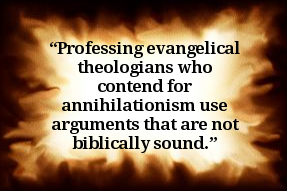Fundamentalist Books
Discussion
Now, About Those Differences, Part Fifteen
 The entire “Now About Those Differences” series is available here.
The entire “Now About Those Differences” series is available here.
To Bauder—a Surrejoinder
Kevin,
Even granting that there is no real difference between us, we have not yet finished with this topic. To this point you have emphasized the importance and the fundamental nature of the gospel. You have also indicated that Christians cannot stop with the gospel alone but must move on to other aspects of the faith-once-delivered. Well and good. If we end the conversation here, however, we risk leaving the impression that the rest of the Christian faith is an entirely separate thing from the gospel.
To anticipate an objection, I certainly agree that Christianity includes something besides the gospel. If we make Christianity equal to the gospel alone, then we are likely to fall into one of two errors. The first is to depreciate everything in the faith that does not fit our definition of the gospel. The second is to expand our definition of the gospel to include other forms of Christian belief and activity.
The first error is committed by those who wish to limit biblical inerrancy to the Bible’s saving message. Doing so allows them (as they see it) to affirm inerrancy while also affirming that the Bible makes mistakes in matters of science and history. Since science and history are supposedly not part of the Bible’s saving message, they do not count against inerrancy.
The second error is committed by varieties of people who wish to “front-load” the gospel with their pet doctrines and theories. An example is those folks who insist that we do not have God’s Word unless we have all of God’s words, and that we have all of God’s words only in their particular version of the Bible. At the opposite end of the theological spectrum, representatives of the emergent church make a similar mistake when they try to include social, psychological, or environmental concerns as part of the gospel.
Some doctrines and practices are essential to the gospel. Others are not. Error in the essentials constitutes apostasy. Error over non-essentials does not. If we fail to maintain this distinction, we will end up charging with heresy anyone who disagrees with the details of our doctrine or practice. Such a charge is clearly not warranted: a person who holds the wrong view of the sons of God in Genesis 6 is not an apostate.
Discussion
We are in deep overreaction to charismatics. It is costing us.
Have F become gun shy in areas that are considered connected to the charismatics? Have we thrown out the baby with the bath? Have decades of warnings against over-emotionalism, walking the pew backs, pushed us too far in the opposite direction? Are pulpits treating a frost bite victim for heat exhaustion?
Discussion
Is Hell Forever? Evangelicals and Eternal Retribution
 Reprinted with permission from Voice, Sept./Oct, 2001. By Dr. James R. Mook.
Reprinted with permission from Voice, Sept./Oct, 2001. By Dr. James R. Mook.
Will the destiny of the unsaved be eternal conscious torment or annihilation (total cessation of existence)? The eternal conscious punishment of the lost has always been a fundamental doctrine of Christian orthodoxy. Tertullian, Augustine, Luther, Calvin, Wesley, Edwards, Pieper, Berkhof, Shedd, Chafer, Erickson, and other theologians affirmed the doctrine of eternal conscious punishment as a biblical essential-explicitly defining divine eternal “punishment” against “annihilation.” (Robert A. Peterson, Hell on Trial: The Case for Eternal Punishment, Presbyterian & Reformed Publishing Co., 1995, pp. 97-137.)
But in recent years some prominent professing evangelicals have advocated conditional annihilationism (which includes the concept of postmortem evangelizing of those who die without having heard the gospel).
Examples: Philip E. Hughes, Clark H. Pinnock, John R. W. Stott, and John W. Wenham.
Discussion
Left Behind: The Apparent Absence of Fundamentalists in Resurgent Church Planting

While Fundamentalists often noisily do battle over issues important mostly to their sub-culture, there is a battlefield where Fundamentalists are conspicuous by their absence. There has been a resurgence in church planting in North America and few Fundamentalist churches have answered the call. The names of leaders in this resurgence are well-known and include Mark Driscoll, Tim Keller, Bob Roberts, and Ed Stetzer, to name a few. Whatever Fundamentalists think of these men, let there be no doubt that they are engaged in the most noble of tasks—the Great Commission—on a scale rarely seen and in cities which, with some notable exceptions, have been long abandoned by solid, Bible-believing churches. These leaders are not without their foibles, and controversy often surrounds or follows some of them. That said, it must be asked if there are any church planting movements in Fundamentalism with the depth and breadth of what is taking place in conservative evangelical circles.
Recently I attended a conference on church planting where several thousand active or prospective church planters and their wives were in attendance. Admittedly the presenters and attendees were from diverse evangelical backgrounds, a blessing in many ways in witnessing the diversity and unity of the body of Christ. Many in attendance could not plant churches together, a fact they recognized, due to doctrinal differences that are at the heart of one’s understanding of the nature the local church. One speaker, a prominent Southern Baptist leader, expressed his friendship with and admiration for Tim Keller, yet confessed that they could not plant a church together. There would be an immediate conflict over needing a bowl or a bathtub to baptize the first convert. Yet in spite of obvious differences and the inability to partner in church planting there was a laudable spirit of cooperation to help others plant churches by providing training, mentoring, and access to resources.
Discussion
"The Fundamentals II"
Body
Discussion
Main Strengths of IFB?
How is God currently using (southern oriented) IFM and similar? I do not intentionally discriminate vs northern or other IFB but am just simply evaluating what I am familiar with. No slight, no offense intended! OK? If this southern shoe fits you too, so much the better. Join in! No movement no church, is or should, be trying to do too many things, IMO. Let’s step back and take an objective look at us - self evaluation..Yes we have needs and weaknesses but right now what are we being and doing well, relative to other movements?
Discussion